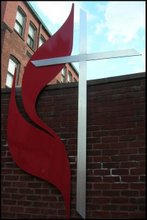It is our task. Christ is the light, and now we are the light of the world, pushing back the darkness. Knocking holes in the darkness of the world.
Consider this. In West Virginia, one in three children lives in poverty. Almost 10% of babies are born with low birth weight. In our schools, 55% of students are approved for a free or reduced lunch. Over half of all fourth graders in West Virginia cannot read at what is considered a proficient level. Children who lived in poverty are more likely to have children outside of marriage, to be arrested, and to have severe health problems. What can we do about this kind of darkness?
The Lydia Circle heard these statistics. The teachers in the group told the women in the Circle that some of the students approved for free lunches in our schools go home every weekend and don’t eat again until Monday, because school food is their only food. These women stopped focusing what they could not do. They started a back-pack ministry.
Each week these women pack a weekend’s worth of food in large plastic Ziploc bags. They deliver the bags to a neighborhood school where the bags are placed in the backpacks of 10 specific students. Each weekend – every weekend -- these 10 students have something to eat. They are no longer hungry. The Lydia Circle has plans to expand the ministry so that no child in that school spends the weekend without food. They are punching holes in the darkness.
We must ask ourselves, how are we called to punch holes in the darkness?
Adam Hamilton, a United Methodist minister at the Church of the Resurrection in Kansas City tells a story about Robert Louis Stevenson, a 19th century author. As a young boy, Stevenson was sitting in his room, watching the lamplighter go from gas street lamp to gas street lamp, lighting each one with a torch. He placed his ladder, climbed up, lighted the lamp and then moved on the next. The young boy was fascinated by this. His father opens his bedroom door, and Robert doesn’t even notice that someone has come into his room. He just keeps watching as more and more lamps are lighted on the street. Finally his father asks him, “Son, what are you looking at? What is so fascinating outside that you don’t even notice that I’ve come into the room?” Robert answers, “Daddy, I’m watching that man out there knock holes in the darkness.”
It is our task. Christ is the light, and now we are the light of the world, pushing back the darkness. Knocking holes in the darkness of the world.
Consider this. In West Virginia, one in three children lives in poverty. Almost 10% of babies are born with low birth weight. In our schools, 55% of students are approved for a free or reduced lunch. Over half of all fourth graders in West Virginia cannot read at what is considered a proficient level. Children who lived in poverty are more likely to have children outside of marriage, to be arrested, and to have severe health problems. What can we do about this kind of darkness?
The Lydia Circle heard these statistics. The teachers in the group told the women in the Circle that some of the students approved for free lunches in our schools go home every weekend and don’t eat again until Monday, because school food is their only food. These women stopped focusing what they could not do. They started a back-pack ministry.
Each week these women pack a weekend’s worth of food in large plastic Ziploc bags. They deliver the bags to a neighborhood school where the bags are placed in the backpacks of 10 specific students. Each weekend – every weekend -- these 10 students have something to eat. They are no longer hungry. The Lydia Circle has plans to expand the ministry so that no child in that school spends the weekend without food. They are punching holes in the darkness.
I am inspired by the Lydia Circle, and I am grateful for what they are chosen to do. As we follow their lead, we must ask ourselves, how are we called to punch holes in the darkness?
Kim Matthews




No comments:
Post a Comment